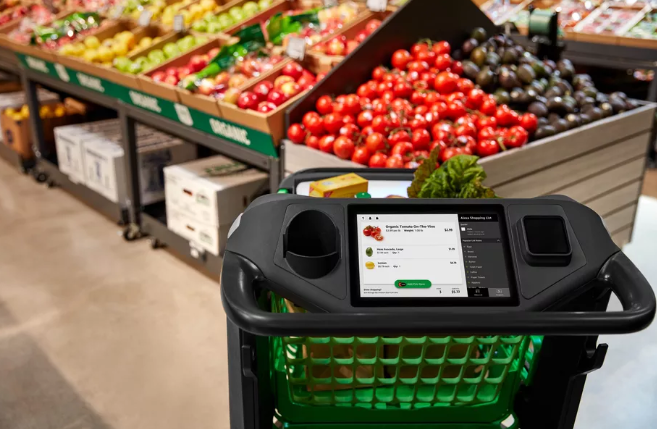T&D Designer and Manufaturer in China
Amazon launches new smart shopping cart that allows checkout without the need for a cashier
Release dateŻ║2024-09-21 sourceŻ║http://www.shop-shelving.com/Amazon is expanding its real-world footprint through another unconventional physical product: shopping carts. Although it may seem like an aesthetic upgrade to a standard grocery shopping cart, the Dash Cart is actually an intelligent version of a reliable transport vehicle.

Dash Cart is equipped with a touch screen and various other hardware components that can automatically detect what items shoppers have placed inside, and even how many items they have selected from the shelves. After shopping, consumers can take their shopping cart through a special channel and pay them out digitally without the need for a human cashier.
This idea is based on Amazon's approach of attempting to bring the convenience it has mastered in the digital field into the real world. For many years, Amazon has been trying to apply all the knowledge it gained from developing Alexa products, including microwave ovens and wall clocks, and establishing physical stores through the acquisition of Whole Foods and the growing Amazon Go store network. These efforts now bring about hybrid products that connect digital and physical, even if it's just a small-scale experimental explosion.
Dash Cart will first enter Amazon's grocery store located near Woodland Hills in Los Angeles. This store was first confirmed last year and is not an Amazon Go store, which means it does not have built-in cameras, sensors, and other devices on the ceiling to automatically detect items you remove from the shelves. On the contrary, this is a standard daily grocery store, but it has an Amazon made smart grocery truck for you to use. This store has started operating to fulfill online grocery orders, but the physical space has not yet been opened to the public; Amazon has stated that its goal is to open a store later this year. The store has joined Amazon's existing Whole Foods network, as well as a larger form of Amazon Go grocery store that opened in Seattle in February.
It is currently unclear why Amazon chose a more traditional store, as it has over twenty Amazon Go stores and plans to establish a second Go Grocery in the Redmond area of Washington state. On the one hand, it may be difficult to measure the Go model by the scale required for a full-service grocery store. The Go grocery store in Seattle is relatively small, while the new Woodland Mountain store is said to be located in the former location of Toys "R" Us and is definitely much larger. In addition, there is a privacy issue, whether the tracking and monitoring methods in the form of Go may not be as convenient as the smart shopping cart that consumers must choose to use.
That being said, expanding the scale of its cashless methods is indeed a challenge that Amazon is striving to overcome, both from a privacy perspective and from a technical perspective, and the small cart is a way to achieve this goal in a small but big way. At present, Amazon is not ready to use Dash Cart technology for anything beyond low-key grocery trips. Therefore, the device can handle up to about two bags of items, but it cannot yet make a complete shopping cart. This means that Woodland Hills stores will have standard shopping carts and standard checkout channels for all customers who shop, instead of what Dash Cart allows.

The shopping cart only processes the shopper's order at the end of the trip, as they logged into their Amazon account with their phone and scanned it at the beginning of the shopping process. The shopping cart also has a built-in coupon scanner and supports Amazon's Alexa shopping list feature. When shopping is completed, Amazon states that the dedicated Dash Cart channel allows shoppers to leave the store directly without processing payments or waiting on the checkout line.


